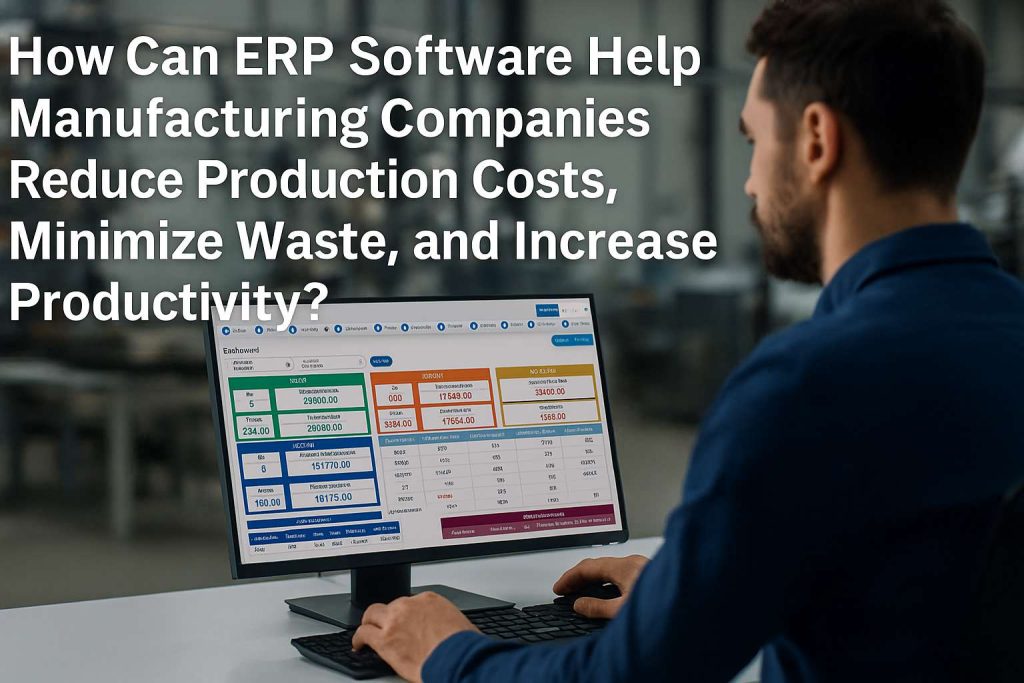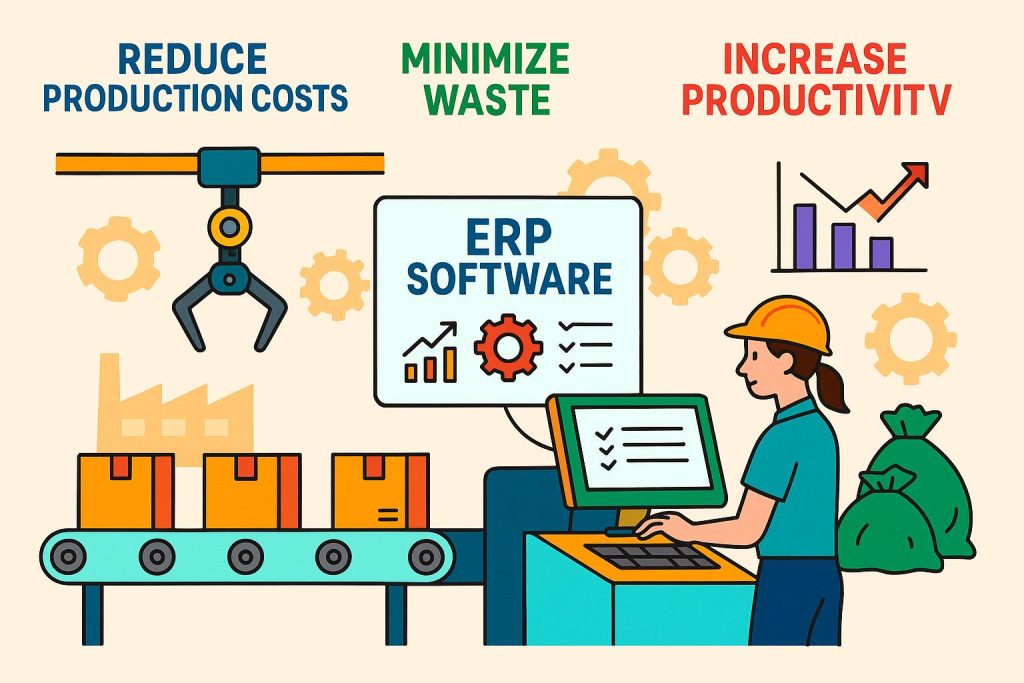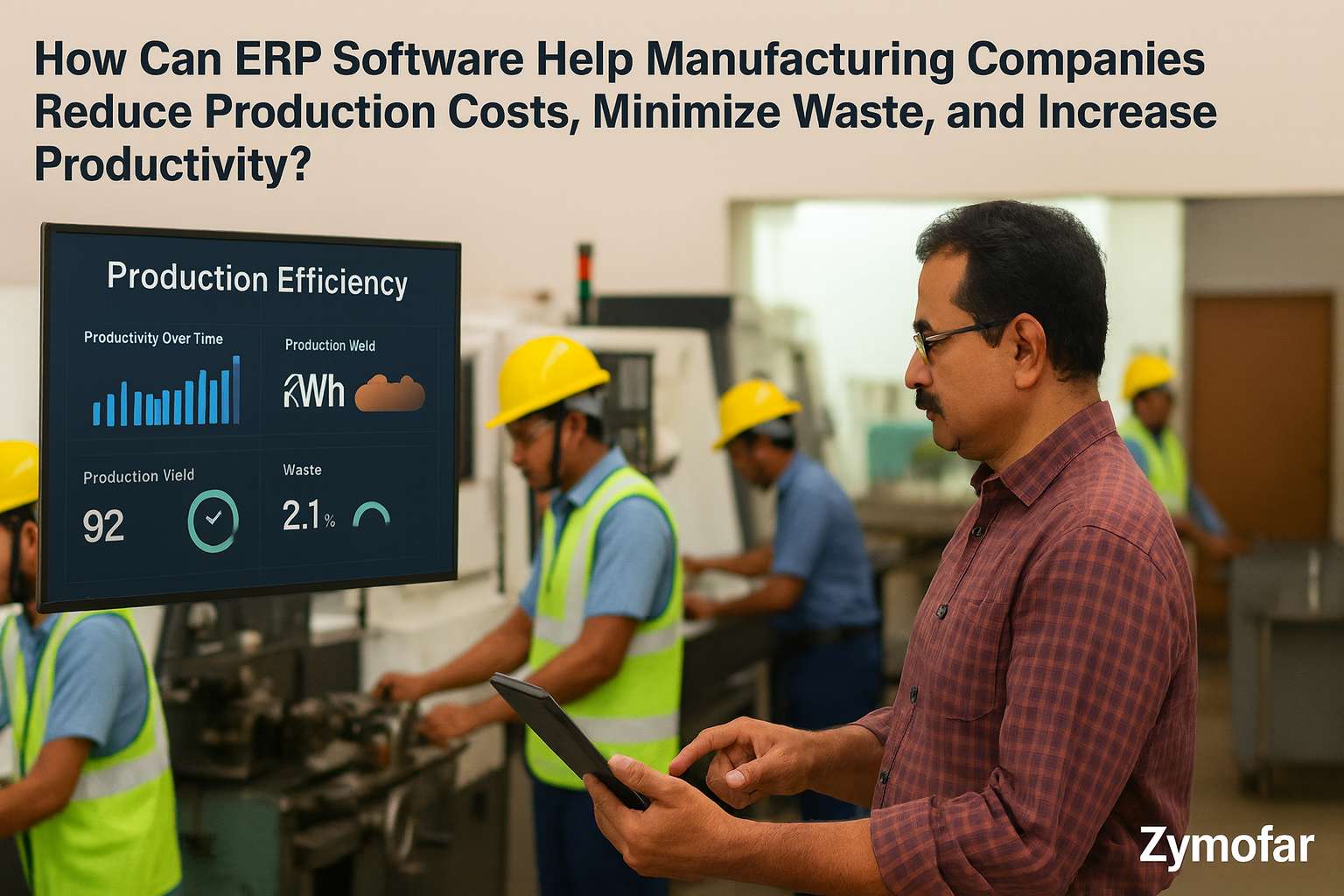In today’s highly competitive manufacturing landscape, companies are under immense pressure to deliver high-quality products at lower costs while maintaining efficiency and speed. Manual processes, disconnected systems, and poor visibility into operations often lead to increased expenses, wasted resources, and missed deadlines.
This is where Enterprise Resource Planning (ERP) software comes into play. By unifying all critical business operations into a single platform—such as production planning, inventory management, procurement, finance, sales, and HR—ERP empowers manufacturing companies to work smarter, faster, and more profitably.
But how exactly can ERP help manufacturers cut costs, minimize waste, and boost productivity? Let’s explore.
Reducing Production Costs with ERP Software
📌 Better Resource Allocation
ERP ensures that resources like raw materials, labor, and machinery are allocated efficiently. Manufacturers can see exactly where resources are being underutilized and adjust in real-time.
📌 Real-Time Inventory Management
Instead of tying up capital in excess stock, ERP helps businesses maintain optimal inventory levels. This prevents over-purchasing, reduces carrying costs, and avoids stockouts that halt production.
📌 Demand Forecasting and Planning
ERP systems use historical sales data, market trends, and predictive analytics to forecast demand. Accurate forecasting helps reduce unnecessary production runs, saving both material and labor costs.
📌 Automation of Manual Tasks
By automating tasks like purchase order generation, material requirement planning (MRP), and invoicing, ERP reduces labor costs and human errors.

Minimizing Waste with ERP Software
📌 Lean Manufacturing Support
ERP aligns with lean manufacturing principles by tracking production cycles and identifying areas of inefficiency. Waste caused by machine downtime, overproduction, or defective items can be minimized.
📌 Quality Control Integration
ERP systems include quality checks at different stages of production. This ensures defective products are caught early, reducing material waste and costly rework.
📌 Real-Time Data Insights
With ERP, managers get instant visibility into shop-floor operations. If a machine is consuming more raw materials than expected or if a process is producing too much scrap, it can be flagged immediately.
📌 Smarter Procurement
ERP prevents raw material overstocking or expiration (especially important in industries like food processing or chemicals). Timely procurement reduces wastage and improves material usage.
Increasing Productivity with ERP Software
📌 Streamlined Workflow Management
ERP eliminates silos between departments—production, finance, procurement, and sales all operate on one platform. This ensures faster decision-making and smooth workflow execution.
📌 Enhanced Production Scheduling
ERP provides intelligent production scheduling tools that consider resource availability, machine capacity, and deadlines. This reduces downtime and maximizes throughput.
📌 Mobility and Remote Access
Modern cloud ERP solutions allow managers and employees to access production data from anywhere, ensuring quick responses to issues and uninterrupted productivity.
📌 Performance Monitoring and Reporting
ERP generates detailed performance reports—from machine efficiency to employee productivity. With these insights, managers can identify bottlenecks and continuously optimize operations.
Additional Benefits of ERP in Manufacturing
- Regulatory Compliance: ERP ensures accurate documentation and audit trails, reducing compliance risks.
- Customer Satisfaction: Faster deliveries, accurate order tracking, and high-quality output improve customer experience.
- Cost Transparency: ERP provides a 360-degree view of expenses, enabling manufacturers to cut hidden costs.
- Scalability: As the company grows, ERP scales seamlessly to handle higher production volumes.
Increasing Productivity with ERP Software
In manufacturing, productivity is the backbone of profitability. A few hours of downtime, poor planning, or miscommunication between departments can result in missed deadlines, unhappy customers, and increased costs. ERP software directly addresses these challenges by creating an environment where every process, resource, and decision is optimized for speed and efficiency.
Let’s explore in depth how ERP boosts productivity for manufacturing businesses:
📌 Streamlined Workflow Management
- Single Source of Truth: With ERP, all departments—production, procurement, finance, sales, HR—work on a centralized platform, eliminating duplicated efforts and conflicting data.
- Automated Approvals: Instead of waiting for manual signatures or email chains, ERP enables automated approval flows for purchase requests, work orders, and invoices.
- Cross-Department Collaboration: For example, if sales closes a new order, production instantly sees the demand, procurement is alerted for raw materials, and finance prepares budgets—without delays.
Result: Manufacturers cut down on communication delays, reduce manual errors, and accelerate decision-making.
📌 Enhanced Production Scheduling
- Capacity Planning: ERP considers machine availability, workforce capacity, and material availability before scheduling jobs, ensuring maximum utilization of resources.
- Dynamic Rescheduling: If a machine breaks down or raw materials arrive late, ERP automatically adjusts schedules, preventing downtime.
- Multi-Plant Coordination: For manufacturers with multiple factories, ERP balances production loads across plants, avoiding overburden in one facility while another remains underutilized.
Example: A textile manufacturer can run weaving, dyeing, and stitching in a sequence where machines don’t sit idle waiting for inputs—leading to faster delivery cycles.
📌 Mobility and Remote Access
- Mobile Dashboards: Shop-floor supervisors and managers can monitor live production from tablets or smartphones.
- Remote Decision-Making: In case of disruptions (like a delayed supplier shipment), managers can approve alternative sourcing remotely.
- Employee Productivity Tracking: Workers can log tasks and timesheets directly via mobile, ensuring accurate labor reporting.
Impact: Downtime caused by waiting for managerial decisions is reduced dramatically, especially in global or multi-shift operations.

📌 Performance Monitoring and Reporting
- Real-Time Analytics: ERP provides dashboards showing live metrics such as OEE (Overall Equipment Effectiveness), defect rates, and throughput.
- Employee Productivity Metrics: Managers can analyze performance data to reward top performers and train underperformers.
- Bottleneck Identification: If one machine in a line slows down output, ERP highlights the issue immediately.
- Predictive Insights: Using historical data, ERP predicts likely slowdowns (e.g., seasonal demand spikes or machine fatigue), allowing proactive planning.
📌 Shop-Floor Automation & IoT Integration
Modern ERP integrates with IoT (Internet of Things) sensors and smart machines to:
- Collect live data from CNC machines, conveyors, or robotics.
- Track energy usage to reduce utility costs.
- Monitor temperature-sensitive processes in real time (e.g., food, pharma, or chemicals).
Benefit: Automated data collection reduces manual reporting time and increases accuracy, freeing employees to focus on higher-value work.
📌 Faster Decision-Making Through AI & Predictive Analytics
- AI-Powered Recommendations: ERP suggests which production line should handle a new order based on efficiency, availability, and costs.
- Predictive Maintenance: ERP predicts when machines will need servicing, preventing breakdowns and production halts.
- What-If Scenarios: Managers can simulate changes (e.g., increasing order volume by 20%) and see the impact on timelines, resources, and costs.
📌 Better Supplier and Vendor Management
- Integrated Procurement: ERP automatically raises purchase requests when inventory drops below thresholds.
- Supplier Performance Tracking: Compare vendors based on delivery time, quality, and pricing.
- Reduced Delays: Reliable suppliers = fewer material shortages = smoother production flow.
Impact: No more last-minute scrambling for raw materials, which boosts uptime and productivity.
📌 Workforce Productivity Improvements
- Task Automation: Repetitive administrative tasks like data entry, reporting, and scheduling are automated.
- Skill-Based Assignment: ERP assigns the right employee to the right task based on skill and availability.
- Shift Optimization: Managers can optimize shift schedules to reduce overtime costs and fatigue.
📌 End-to-End Visibility for Faster Problem Resolution
One of the most common productivity killers in manufacturing is lack of visibility.
- ERP gives a 360° real-time view of production lines, raw material flow, order status, and delivery timelines.
- If an issue arises—like a supplier delay or quality defect—the responsible teams can address it immediately, instead of discovering it days later.
📌 Customer-Centric Productivity
- Accurate Order Promising: ERP ensures customers get realistic delivery dates based on live capacity and material availability.
- Faster Order Fulfillment: With streamlined scheduling and inventory tracking, lead times shrink significantly.
- After-Sales Productivity: ERP integrates service management, ensuring warranty claims and customer service are handled quickly.
Zymofar Dynamic Products Pvt. Ltd., established in 2014 and headquartered in Bangalore, India, is a leading software development company specializing in custom-built ERP solutions and industry-specific business software.
At Zymofar, we design solutions that are tailor-made for manufacturing, retail, and restaurant industries. Our flagship products include:
- WiderERP – A complete ERP platform for manufacturing, wholesale, distribution, and multi-vertical industries.
- RetailMass – Smart ERP and billing solution for retail businesses to manage inventory, billing, and multi-store operations.
- RestroPro – A restaurant ERP and billing solution for dine-in, takeaway, and delivery management with smart inventory control.
- JustBilling & JustERP – Flexible ERP and billing software for SMEs and growing businesses.
Our Core Services
- Customized ERP software development for manufacturing, retail, and service industries.
- Billing software solutions for retail shops, restaurants, and wholesalers.
- Web application design and development.
- Mobile app development for iOS and Android.
- Specialized digital transformation solutions tailored for business growth.
With a strong focus on innovation, quality, and client satisfaction, Zymofar has been helping businesses streamline operations, reduce costs, and scale efficiently.
📞 Contact Us: +91 7090335533
🌐 Website: www.zymofar.com
📍 Head Office: Bangalore, India


